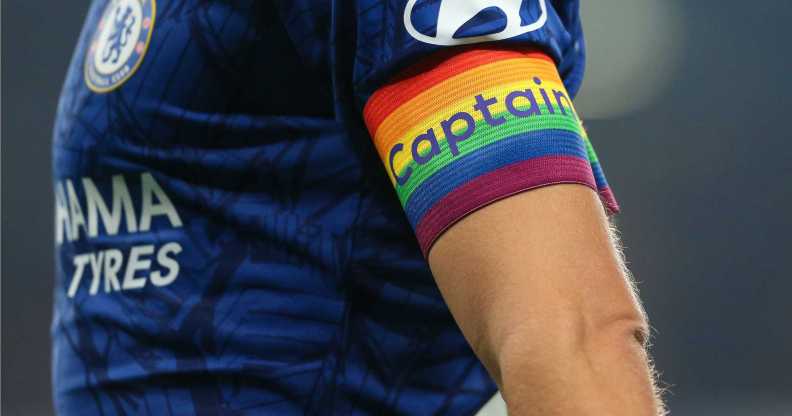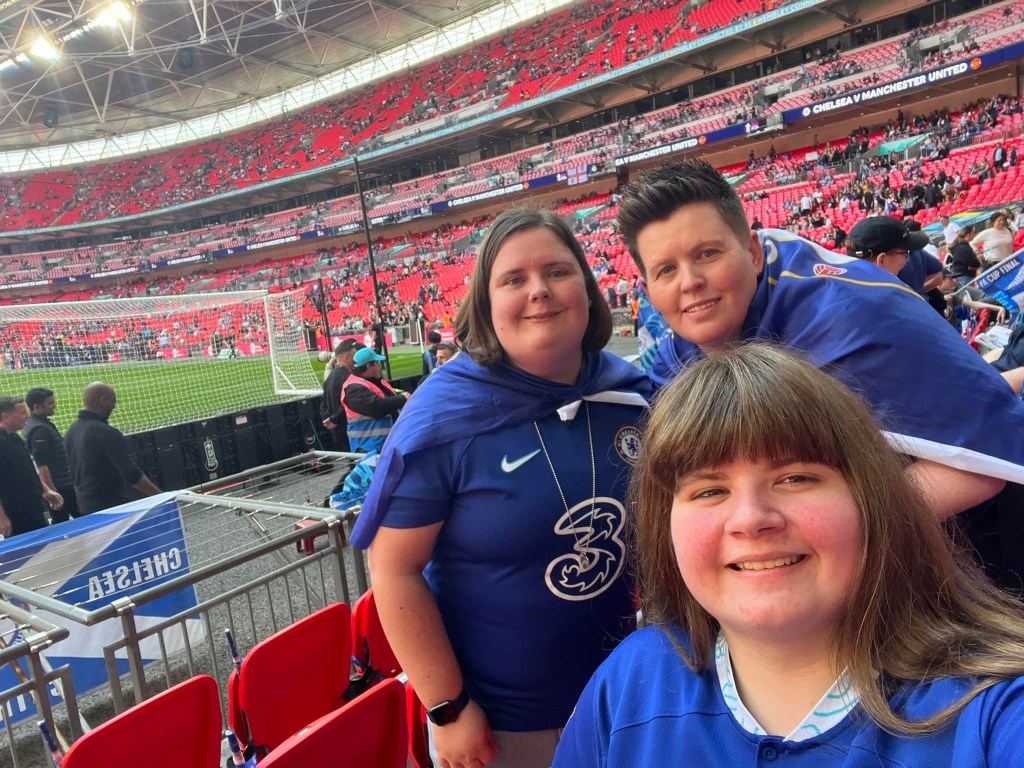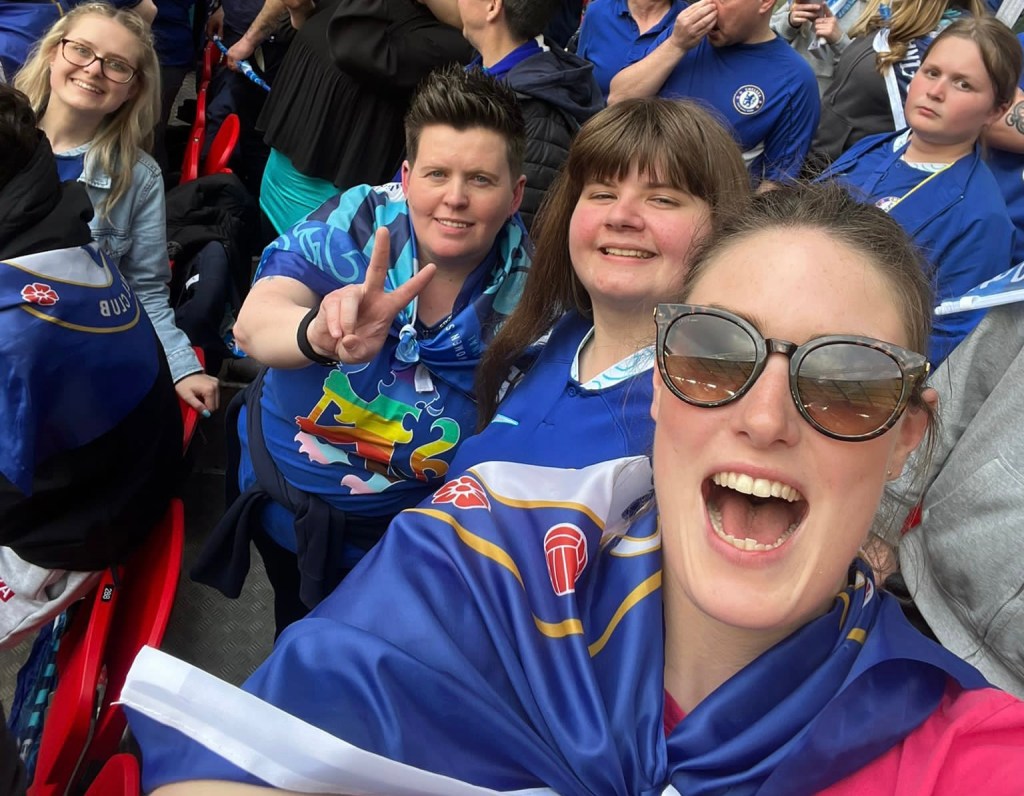Men – don’t bring your homophobia into women’s football, Chelsea Pride chair warns

A rainbow armband. (Charlotte Wilson/Offside/Offside via Getty Images)
As women’s football grows in popularity, particularly since England’s historic win at the 2022 Euros, the chair of Chelsea Pride warns that anti-LGBTQ+ hate must not be allowed to spill over into the women’s game.
This year has seen a spate of arrests, charges, fines and bans over discriminatory abuse at men’s football matches, with the homophobic ‘Chelsea rent boy’ chant repeatedly making headlines as a catalyst for police and Football Association (FA) involvement.
In April, two separate instances of homophobic abuse during matches resulted in charges and three and four-year bans for a Nottingham Forest fan and Millwall fan respectively.
The same month saw three men arrested over homophobic and discriminatory chants at a Wolves vs Chelsea match – and Wolverhampton Wanderers later received an official charge from the FA.
With club officials and the FA appearing to take anti-LGBTQ+ abuse at matches more seriously, is homophobia finally being kicked out of football?
According to Tracy Brown, an out and proud lesbian who has been the chair of Chelsea Pride for nearly seven years, there’s still a long way to go.
“Since lockdown and coming back into the stadium, we’ve seen discrimination, homophobia, misogyny – all of that – go through the roof,” Brown tells PinkNews. “It’s like a free-for-all within stadiums at men’s games – like fans have gone feral.”
Brown is the equality, diversity and inclusion representative on the Fan Advisory Board at Chelsea FC. She’s also co-chair of the Rainbow Wall LGBTQ+ supporters group for Welsh national teams, co-founder and co-chair of Pride in Cricket, guidance council for the Football Supporters Association, and – if she wasn’t busy enough – also sits on the board of trustees for the Paul Canoville Foundation, which supports young people facing adversity.
Brown speaks passionately about the problems facing men’s football and how, since the COVID-19 pandemic, behaviour at games has deteriorated.
“With drinking and drug-taking, I swear we’re back in the 70s and 80s. It’s rampant,” she says.
“When you look at people who are abusive within a crowd, they’re normally abusive across the board. If you’re going to be racist, you’re going to be homophobic, you’re gonna be transphobic, you’re going to be antisemitic.”

Men’s football has a homophobia problem
A recent study found that one in three queer adults have experienced anti-LGBTQ+ hate at live sports events, with 53 per cent encountering homophobic or transphobic abuse at men’s football matches, compared with just 23 per cent at women’s football games.
“There are so many people I know, who have told me: ‘I can’t do this anymore. I can’t can’t go to the men’s game anymore. I just can’t do it,’” Brown says.
“My cousin has an 11-year-old daughter, who said to me only a couple of weeks ago: ‘I would never step foot into a men’s stadium with my daughter, because of what I hear.’
“That is shocking, because we’re in 2023, but this could be the 50, 60 years ago. The only thing we’re missing is people meeting up a mile down the road and having a good kicking. And if we continue the way we’re going, that’s exactly what’s going to be coming back – football hooliganism.”
Brown works closely with Chelsea FC on many different forms of campaigns – not just for the LGBTQ+ community – and says it’s a “constant fight” to battle hate in football.
“It does feel like we’ve taken a huge step backwards when it comes to the men’s game,” she explains, “and it’s not like clubs aren’t working hard to try and get this out of football – because they are.”
In January, the FA announced that clubs whose fans use the homophobic “rent boy” chant during FA matches could be charged. The chant is now considered to be a breach of FA rules, and the Football Association has said it is “determined to drive it out of the game”.
While Brown wants the chant stamped out across the league, she says Chelsea first has to get its own house in order.
“We can’t tell other clubs to say, stop the ‘Chelsea rent boy’ chant, it’s illegal, if we can’t get our own fans to behave on other grounds. And that is really, really important.
“It’s very difficult when you start criticising your own. No one wants to hear that we’ve got bad fans, but everyone does and you have to be responsible enough to admit it.”
Growing the women’s game – carefully
Brown describes a “completely different feel” at women’s football matches, calling it a far more “inclusive” environment.
With Chelsea FC Women’s historic win of a third FA Cup final in April under openly lesbian captain Magdalena Eriksson, there is much to celebrate. But as the women’s game grows, Brown warns, more fans are coming in from the men’s side and bringing negative behaviour and attitudes with them.
“We’ve got to be really careful, as we grow the women’s game, that we teach those new crowds coming in from the men’s side, that this is how we do it here.
“The reason we don’t want to replicate what the men’s game does is because of the vast amount of problems there that have been going on for generations.
“The last thing I want to see is even one per cent of that being dragged into the women’s game.”

But how to address the issues in men’s football, where vile abuse is regularly levelled at players, officials and other fans?
“It’s up to the FA governing bodies and clubs to make sure they address this in a way where if you keep finding fans who are doing this, they can’t be fans anymore,” Brown says. “You can’t let them into your stadiums. They don’t deserve to be members or season ticket-holders.
“I believe in education before prosecution. However, there are some people who don’t want to be educated. They have this attitude of ‘I can say what I want, stop bringing PC into football’ and then that word comes out that I can’t stand: banter.
“It’s not banter, it’s abuse. It affects people’s mental health, it stops people from going to the game and it’s holding a generation of kids back, because are people who wouldn’t even want their children to be inside a men’s stadium.
“And we’ve got to be very careful that we don’t get to a point where we’re losing young fans before we even get started. If we allow this negativity to continue, it’s only going to get worse.”
‘If I was a gay male footballer, I wouldn’t feel safe enough to come out’
It’s clear from the lack of openly gay and bisexual players in men’s football that homophobia is still rife. In the men’s Premier League, there isn’t currently a single ‘out’ gay player. The only openly gay professional men’s footballer is Blackpool FC forward Jake Daniels in the Championship, the first to come out since Justin Fashanu in 1990.
Although it’s not easy for her to admit this, Brown says that if she were a gay man in the Premier League, she wouldn’t come out. Brown has been out as a lesbian for over 30 years, but says it’s a “huge risk” for male players to show their authentic selves.
“It wouldn’t surprise me if we have some players within our men’s team who are gay, but I know what it’s like being in our stadium when all you hear, week in week out, is the ‘Chelsea rent boy’ chant.
“It’s going to take someone very, very, very brave to do it, and they will get a vast backing. But if I was a gay male player, I wouldn’t feel safe enough within the Premier League to come out and when I say that, it absolutely pains me. It really does.
“The risk of coming out and then the risk of mental illness and the knock-on effects for this are absolutely huge. But being in the closet is really detrimental to your mental health. You’re having to play your whole career, pretending to be someone you’re not.
“If you could be yourself, it will most probably improve your game and your life. But at what cost? The abuse you may get may be just too much to bear.”
However, Brown is hopeful that football can be different and she’s seen an increase in people coming forward to report abusive behaviour at live events.
“Now, compared to say, 10 years ago, more people are willing to report, they’re willing to say: ‘I don’t accept that,’” she says.
“It’s going to take all of us together as a collective to try and change those attitudes. I love the game so much, and my hope is that we train our youngsters differently.”
How did this story make you feel?

